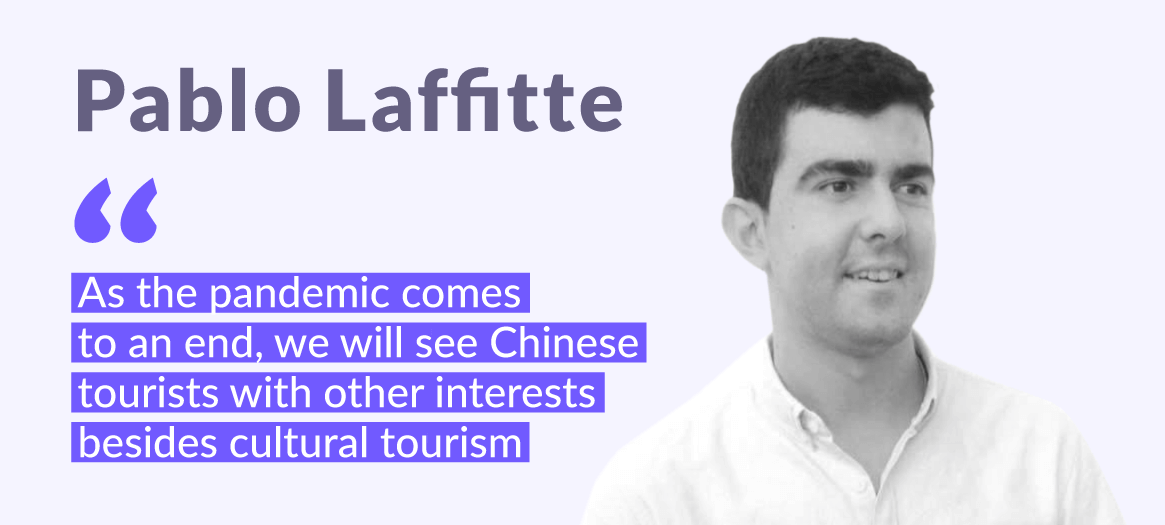
Interviews 4:10 Min read
Pablo Laffitte: “As the pandemic comes to an end, we will see Chinese tourists who are interested in more than just cultural tourism.”
Pablo Laffitte is an expert in Chinese tourism and recently launched his own hotel industry marketing agency, which focuses specifically on this market.
Pablo has been curious about the tourism industry since he was very young. However, he began his career in audio-visual communication, creating an online radio channel with an international following before starting to work full time in tourism.
Laffitte has experience in Front Office, Bookings, Cost Control and Revenue Management, both in urban hotels and 3 and 4 * holiday resorts. It wasn’t until 2016 that he started to show an interest in Chinese tourism, broadening his knowledge of the Asian country’s culture.
The pandemic represented a turning point in his specialisation, and he began to develop solutions which were adapted to the Chinese market, such as his first eBook about Chinese tourism for luxury hotels. His next projects include two new book releases about WeChat Marketing and SEO positioning on the Chinese search engine Baidu for hotels.
Why did you decide to specialise in the tourism industry, and in Chinese and luxury tourism specifically?
I’ve been interested in tourism since I was 3 years old, when I travelled abroad for the first time, to Disneyland Paris. When I got to the hotel, I didn’t want to leave.
In terms of luxury Chinese tourism, everything started about five years ago when I discovered the fascinating world of Mandarin Chinese and how to learn it. Since then, I haven’t stopped interacting with Chinese tourists in the different hotels that I’ve worked in, making Chinese friends, and researching the tourism industry in China.
Is Spain an attractive destination for Chinese tourists? And do they offer value to the Spanish tourism industry?
Spain has all the ingredients that Chinese tourists desire: a rich historical heritage, excellent gastronomy, a fantastic climate, and a great fashion supply chain. Chinese tourists love these four attributes that Spain has to offer.
Regarding whether Chinese tourists are attractive for the Spanish tourism industry – without a doubt, we need these tourists. Besides being one of the three main issuing markets who spend the most, they also help to boost out-of-season tourism.
What are the priorities and needs of these tourists when they travel? Is technology one of them?
Chinese tourists want to learn about Spain’s history (visiting the most emblematic places), taste our country’s finest gastronomy, go shopping, and they are even interested in our football (they mainly follow Real Madrid and Barcelona). Recently, they have started to become interested in Spanish coastal destinations. As the pandemic comes to an end, we will see Chinese tourists who are interested in more than just cultural tourism.
When they are traveling, they can’t be separated from their mobile phones: their phones are a part of them, and they wouldn’t contemplate a trip without taking photos and talking about what they think of their holiday destination on Chinese social media.
What platforms do they use on their journey?
They mainly use WeChat (Chinese WhatsApp), Xiaohongshu (Chinese Instagram) and Baidu, their search engine which is similar to Google. Not forgetting their Alipay payment system for making purchases.
Which booking channels do they use and trust most (direct, OTAs, travel agencies, etc.)?
Mainly Ctrip, Qunar, Magenwo, Elong, Melitina and Tongcheng.
What are Chinese tourists looking for in a hotel, specifically?
Chinese tourists want comfort, a location close to places of interest and where possible, service that is adapted to their needs. If the hotel staff and receptionists can speak Chinese, better still.
Is the hotel industry prepared for this type of tourist?
There is more and more interest in understanding the Chinese market and more hotels have quite an interesting number of Chinese tourists booking rooms. But we have a way to go if the sector and its professionals are to fully understand the ins and outs of Chinese culture.
What is the key to adapting the tourism and hotel offer to Chinese tourists?
It is vital that professionals in the sector learn Mandarin Chinese, to be able to communicate with the guests in their native language and give them all the tourist information that they need (about services, attractions, etc.) translated into Mandarin. On the other hand, Spain, as a tourist brand, needs to work on their positioning on Baidu and other Chinese marketing and communication channels.
Specifically, what does the hotel industry need to do to attract Chinese tourists? Which technological solutions does a hotel need to use to capture this market?
A hotel wishing to attract tourists from China must have staff who are specialised in all aspects of Chinese tourism, from their digital habits to their language.
Their website must be translated into Mandarin Chinese, with a WeChat channel to interact with potential guests in their native language. It must also be positioned on the search engine Baidu, and it wouldn’t be a bad idea to do video marketing on Youku, a social media channel which is used more and more by Chinese tourists for searches related to travel and tourism.